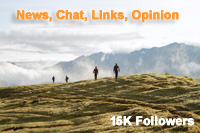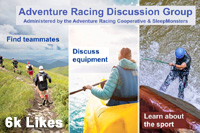Eco-Challenge
Fiji – Paradise or Hell?
Rob / 10.10.2002


Mention Fiji and most people think of a holiday ‘paradise’ isle, but it’s not going to be like that for the teams. When they leave the registration hotel the honeymoon is over.
As the Tourism Minister emphasised as the pre-race reception hosting the race is a chance to show what Fiji has to offer – and to overcome any lingering memories of the political troubles they had there in 2000. The setting and scenery is going to be spectacular and may look good on film, but in reality it’s going to be tough – jungle races always are. The rocks are volcanic and abrasive, as is the coral, the mountains are high, the rivers run fast and jungle is dense. It’s not just hype to say there are large areas of Fiji where no one ever goes.
To start with there are some 333 islands in the Karo Sea of which only 100 are inhabited, and even then it’s mostly small coastal areas where people have settled – very little of the land is capable of agricultural development. The largest island, where the teams will start, is Viti Levu (Big Fiji) which is split by the Nakauvadra mountains running North to South with a high point of 1322m. All the big rivers have their source here and the main ones are called Rewa, Navua, Sigatoka, and Ba. The second largest island is Vanua Levu (big land) and this too rises to over 1000m. Most of the surrounding islands are also volcanic but they have outlying coral reefs to make navigation hazardous.
We don’t know how many islands the teams will get to, but it sounds like the interior rivers and jungles will play a key part. Over half the land surface is jungle and the notes from the course planners talk of bushwhacking and covering 250m per hour! The describe some spectacular waterfall abseils as well. Some of the rivers will be fast flowing and teams will be packrafting – carrying small one person inflatable rafts – but the notes described big, biting eels that prowl the rivers too. There is some good news though. It’s before the rainy season so the water volumes won’t be their height and a lot of the nasties that teams faced a couple of years ago in the jungles of Borneo are not around. No leeches, or poisonous fish this time. (There were fewer jabs too and it’s not a malarial country.
The seas get swells blown up by the Trade Winds, but from what TNF Kona have seen so far they say it’s not too rough and a lot of the coasts are protected by reefs. However, Keith Byrne did say it was surprisingly cool at night with the breeze rising – everything is relative though and he was still talking about temperatures in the 20’s! So far they’ve been on the coast though and temperatures will fall in the mountains. There will be a lot of darkness to deal with too, dusk has been falling around 6.30pm and dawn is some 12 hours later.
It all sounds like a perfect Eco-Challenge setting and combined with the promise of more self sufficiency and problem solving should produce a memorable race – with times the teams will marvel at the scenery around them, and others when they’ll wish were anywhere else on earth!







 SleepMonsters
SleepMonsters



